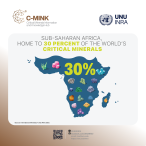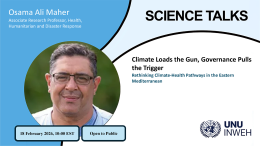Land degradation is a major global challenge that impacts both the environment and people. It does not only impact those directly depending on land and its resources, it also reduces the potential of carbon storage of soils or leads to the destruction of important habitats for species, which is why it has consequences for climate and biodiversity.
The UNCCD’s concept of Land Degradation Neutrality (LDN) is key to halting land degradation, as it sets out the ambition to have no net loss of healthy, productive land by 2030. The indicators set out by UNCCD and used by countries to track their progress towards achieving LDN are largely informed by geospatial data. While the use of geospatial data is highly relevant to inform, for example, restoration activities, there remain challenges in implementation and monitoring in practice. Access to reliable data, including geospatial data, lack of information required for the effective application of integrated land use planning (ILUP), such as land tenure or land potential, and the need to update voluntary LDN targets are some of the key areas requiring attention. On the other hand, geospatial data collected under the LDN indicators can be highly beneficial for contexts beyond land degradation. For example, assessing soil organic carbon with spatial data supports diagnosing the condition of soil and allows taking timely action to prevent loss of soil structural integrity and soil biodiversity. Consequently, these data can not only be used to monitor LDN under the UNCCD but can also contribute to the goals of the other two Rio conventions. Since monitoring efforts and challenges are often overlapping in these contexts, it is sensible to address them in an integrated manner.
Against this complex background, the GEO-LDN flagship initiative, which UNU-EHS is a member of, has released a call for participation in a Regional Dialogue Forum for Pacific Small Island Development Stated (PSIDS), which will be organized and implemented as part of this project by UNU-EHS in 2025. UNU-EHS seeks to use this platform as an opportunity to foster intersectoral and regional exchange on the application of geospatial data to support decision-making processes towards addressing multiple challenges and therefore to reach the goals of the three Rio conventions, the United Nations Framework Convention on Climate Change (UNFCCC) and the Convention on Biological Diversity (CBD), in an integrated manner.
The project is funded by the German Society for International Cooperation.







